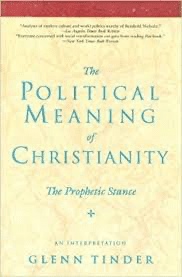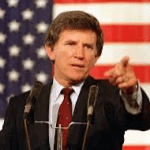Tinder: The Prophetic Stance
These are some of my thoughts about this week’s portion of The Political Meaning of Christianity, Chapter Two: Prophet Hope, The Prophetic Stance Defined and The Individual and the Prophetic Hope (pp. 68-89).
I fear that some of you who began this reading and discussion project have given up. I wish you wouldn’t. Yes, Tinder’s writing can be challenging, but reading him is worth the challenge. I never read something I already know, understand, or agree with. How boring is that? I offer you my help here.
However, rather than simply summarize and quote here I plan to tell you what I get out of these pages and invite your responses and questions.
Here are some of the main ideas I found in these pages:
First, history has meaning. That’s a huge assumption but one Tinder argues for. It shouldn’t be debatable for Christians. But some with gnostic leanings may debate it. Tinder argues that eschatology gives history meaning. He does not take apocalyptic prophetic literature literally. He regards biblical eschatology as symbolic, of God’s victory and the coming of the Kingdom of God. That history has meaning undergirds taking political life seriously.
Second, taking political life seriously has nothing to do with activism, especially of the revolutionary kind. Rather, the Christian posture is waiting for God while also obeying God in history.
In these pages Tinder attempts to turn aside two traditions of Christian attitudes toward political life—quietism (which he calls “mysticism”) and radicalism. The question is to wait attentively for God to lead while daring to step out and act to create community among people.
When reading a book like this I always attempt to identify especially enlightening and thought-providing portions. I find such (among several) on page 75: “If our supreme obligation is to hear and respond to God, we must be wary of firm commitments and set plans. The kind of political and social order we try to create will depend more on God than on changeless principles, and what we do will be determined more by our understanding of God’s will than our prior plans.” (75) “Yet,” Tinder avers, “there is nothing apolitical in these reservations.” (75)
So what is the “prophetic stance” or “prophetic attitude?” I was hoping for a more concrete and specific definition or description than I found here. I am stepping out and daring to guess at this point. I would call it “the prophetic posture” of the Christian toward politics (in the broadest sense). It is a way between cynicism and activism, between quietism (withdrawal) and revolution. But it is not just reforming the social order a la Rauschenbuch and the Social Gospel.
It is based largely on Bonhoeffer’s theology and life. Tinder mentions Bonhoeffer several times and in a good light. Do not buy into any political ideology but regard God as active in history, calling us to act with him. Remain independent of specific political platforms and agendas. Wait on God to lead. Join God in guiding history toward his Kingdom but without any specific preconception of what that looks like.
The main point I get out of these pages, these two sections, is this: The Christian should avoid buying into any human-created ideology or political agenda but should seek God’s will which inevitably will include the good of humanity, community. “Good order” is not the highest good. The highest good, rather, is community, the unity of humanity under God, dare I say peace and justice? But peace and justice not defined by any human philosophy but by God who speaks and shows.
I read this book years ago and I have been strongly influenced by the social ethics of Reinhold Niebuhr and also by the social ethics of Stanley Hauerwas. A strange coupling. But I find Bonhoeffer to be a bridge between them. Tinder’s book no doubt shaped my personal views about politics. I have long remained independent of any human political ideology and platform. I consider most, if not all, to be highly dubious. At the same time, I pay attention to world geo-politics and American politics and make my difficult choices prayerfully and studiously. I do believe that history has meaning and that meaning, to be real meaning, depends on God. Without God there can be no meaning to history. History matters. Politics matter. But God matters more than politics as we think of it. I am wary of governments. I believe power corrupts. I believe the Christian ought to avoid identifying God’s will with any political or ideological or governmental or national identity or program or platform. On the other hand, I believe the Christian ought to be involved in “the public square” and make informed, God-guided decisions. So should the churches. I consider it a shame and tragedy that so many Christians and churches have bought into a particular human-created socio-political program, often uncritically. They can’t be waiting for and listening to God. God calls us to be independent but involved.
*Next, in about a week, I will discuss “The Church and the Prophetic Hope” and “The Question of Liberty” and ”Liberty and the Exalted Individual” (pp. 90-116).
*If you choose to comment, make sure you have read these portions of the book. If you haven’t, you may ask a question. In any case, make sure your comment or question is on topic, addressed to me, civil and respectful (not hostile or argumentative), and devoid of pictures or links.*














